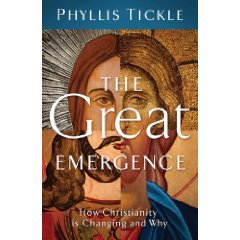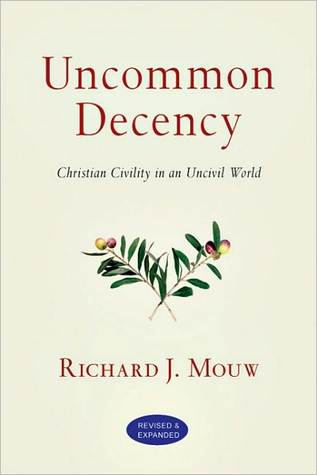We just got in the much anticipated new book by Phyllis Tickle, a book called The Great  Emergence: How Christianity is Changing and Why (Baker; $17.99.) It is a slim volume, rich and gracious and elegant. It walks us through our “contemporary cultural upheaval and the religious consequences” (as Diana Butler Bass puts it on the back jacket) of these huge sea changes. Although I’m not sure she is so pedestrian as to name it, one of the obvious changes is that the faith and politics discusion is remarkably different, extraordinarily so as the religious right is not the only faith-based voice in the conversation. Part of the shift, I think it is obvious, is a new frame for discussing the deepest matters of faith and public life, religion and politics. Happily, as many of us have been saying for decades, Christianity ought not be exiled from public discourse nor aligned with any one party, and can offer insight for a new way of transending the polarities common in typical public discourse. Tickle is a wise guide to the biggest cultural picture, and I’m sure the book will be helpful to explain some very big notions, with very real consequences of these new times.
Emergence: How Christianity is Changing and Why (Baker; $17.99.) It is a slim volume, rich and gracious and elegant. It walks us through our “contemporary cultural upheaval and the religious consequences” (as Diana Butler Bass puts it on the back jacket) of these huge sea changes. Although I’m not sure she is so pedestrian as to name it, one of the obvious changes is that the faith and politics discusion is remarkably different, extraordinarily so as the religious right is not the only faith-based voice in the conversation. Part of the shift, I think it is obvious, is a new frame for discussing the deepest matters of faith and public life, religion and politics. Happily, as many of us have been saying for decades, Christianity ought not be exiled from public discourse nor aligned with any one party, and can offer insight for a new way of transending the polarities common in typical public discourse. Tickle is a wise guide to the biggest cultural picture, and I’m sure the book will be helpful to explain some very big notions, with very real consequences of these new times.
So, into the eye of the storm we go, and last week I started teaching an adult Christian ed class at our church, a class I’m calling Civitas: Christian Responsibilities for Politics, Public Life and the Common Good. The word “civitas” is from the same root Latin word from which we get civility, and implies that we are part of a commonwealth, belonging to a citizenship. Christian citizenship, I’m suggesting, is more than about working for what we want, not even just what helps Christianity. The Bible itself tells us much more and we will explore the themes of public justice, social righteousness, pluralism, violence, and a Biblical view of the state. Ahhh, the “Christ and culture” stuff come up again and we will wrestle with various ways Christians have engaged the surrounding world. You know I’m appreciative of the “beyond the religious right and secular left” rhetoric of Jim Wallis’ God’s Politics and The Great Awakening (and his Sojourners movement) as well as the similiar “red letter Christians” movement of Tony Campolo as described in his book of that name. And even Shane Claibornes radical Jesus for President stuff is very helpful for reminding us to be intentional about our sacred texts and our foundational loyality to Christ, even as we serve within the broader civil society. That there are now resources like this, movements and organizations and books is part of this change. Thank goodness!
Yet, as Ron Sider’s explores in the wonderful Evangelicals for Social Action website (and in his excellent book The Scandal of Evangelical Politics) and as Jim Skillen at the Center for Public Justice has taught us, we must have a comprehensive and Biblically informed public philosophy out of which can emerge a thoughtful and coherent Christian view of citizenship. I reviewed a few books about this last winter at the website column, and we have a somewhat more extensive starter biblio at the “books by vocation” pages, but I now want to add another book which I used the first two weeks of our class. It is just great! It was a special delight—a real blessing!—to re-read it and I truly want to commend it to you.
 I am referring to the beautiful and insightful (and I’d say urgently needed if it weren’t so obvious) Uncommon Decency: Christian Civility in an Uncivil World by Richard Mouw (IVP; $15.00.) This fine book explores heady stuff like pluralism, how Christians (and others) can have deep convictions and yet remain civil, and how civility works out during particular kinds of conversations (like, say about sex.) His call to this uncommon decency is something I feel very strongly about and his guide is the best I’ve seen. For those who know us well, you can be sure I’ve read and re-read his brillant chapter called “Abraham Kuyper, Meet Mother Theresa.” Again, Mouw is so sweetly and admirable able to be clear about his own (Dutch neo-Calvinist) tradition where, with Prime Minister Abraham Kuyper he insists on the Lordship of Christ claiming “every square inch” of his world, and yet is also able to be self-critical of that tradition’s tendencies towards excesses of triumphalism and pride as we work for God’s plan in culture. So, wisely, he introduces Kuyper to the simple and servant heart of Mother T. Ahh, that is it, isn’t it: Kuyper and Theresa. Uncommon Decency indeed.
I am referring to the beautiful and insightful (and I’d say urgently needed if it weren’t so obvious) Uncommon Decency: Christian Civility in an Uncivil World by Richard Mouw (IVP; $15.00.) This fine book explores heady stuff like pluralism, how Christians (and others) can have deep convictions and yet remain civil, and how civility works out during particular kinds of conversations (like, say about sex.) His call to this uncommon decency is something I feel very strongly about and his guide is the best I’ve seen. For those who know us well, you can be sure I’ve read and re-read his brillant chapter called “Abraham Kuyper, Meet Mother Theresa.” Again, Mouw is so sweetly and admirable able to be clear about his own (Dutch neo-Calvinist) tradition where, with Prime Minister Abraham Kuyper he insists on the Lordship of Christ claiming “every square inch” of his world, and yet is also able to be self-critical of that tradition’s tendencies towards excesses of triumphalism and pride as we work for God’s plan in culture. So, wisely, he introduces Kuyper to the simple and servant heart of Mother T. Ahh, that is it, isn’t it: Kuyper and Theresa. Uncommon Decency indeed.
For what it is worth, here is my description of the first two weeks of our class. We’ve got a spiffy poster that Ned Bustard at Square Halo Books and World’s End Images designed for us (I couldn’t figure how to copy my adobe attachment here on the blog but I wish you could see it) and a full syllabus if you want to see it. Just let us know. We’re even taping the class, I think, if you’re desperate for this kind of fellowship and conversation…
For now, we relish the insight of Rich Mouw in Uncommon Decency as the basis from which I can introduce my Presbyterian church friends to “thinking Christianly” about politics with Ron Sider and Jim Skillen and Paul Marshall and David Gushee and so many other moderate, thoughtful, integrated Christian social thinkers who, with civility and insight, call us to be faithful, even in our work as citizens in the civitas. Pray for us if you think of it. And maybe in this urgent season, consider telling others about good books on this topic, buying them now and reading together this fall. Maybe this could be you’re starting point, too.
SEPTEMBER 8th Introduction and the Big Picture
Any Christian study of any topic must be put in the broadest context of God’s call to be involved in service in His world, the matter of how the Bible does or doesn’t influence us, and how to formulate a Christian worldview. That is, we have to develop the mind of Christ and exhibit Christ-likeness, allowing His ways to shape our human activities. We are called to live our lives—in business, recreation, work, or citizenship–in ways that are different than the typical, and may not be beholden to any ideology or partisan viewpoint. We are called to be faithful to God’s Word (which is seen most clearly in Jesus.) Of course there are various ways in which Christians have related the gospel and our life in the world so we will explore several tendencies and highlight a Reformed perspective.
SEPTEMBER 15th Why politics? And how?
There are several reasons why we should develop a Christian political perspective and make an effort to be active in public life. Pragmatically, politics influence
s the lives of our neighbors (not to mention our own) and our call to love others should lead us to care how policies effect them. We are members of a country, a political community, a civitas. Of course we confess that Jesus Himself is the true King and every aspect of our lives must reflect our commitments to His ways. We desire to be faithful in all of life, including public life and citizenship. No aspect of life is removed from our spirituality; political life, like all of life, is an avenue of worship, a way to honor God and witness to Christ’s Kingdom. It can be said that civic life is largely about the common good, the civitas. And certainly, Christians should be in the forefront of a call to civility, fairness and integrity in all our discussions and activism, even when we robustly disagree and are compelled to speak prophetic truth to distorted power.

Byron, I hope all is well. Are you going to attend the Great Emergence event in Memphis in December?
Byron,
Would it be possible to host Purple conversations? Gather together red voters and blue voters, helping them to know one another and listen to one another better.
Stay in One Peace, Tim
Tim,
Great idea…the Sunday school class I mentioned will be a place for some of that, and we’ll have a few guests from varying perspectives, which isn’t exactly what you’re suggestions. We’ve got two thoughtful Christian books about the large tensions these days with purple in the title—so I know what you mean. It would be good to try to find a way to do that here.
Did you hear the NPR feature about race in York? Folks of various ethnicity and different views of race gathered (and will gather again) as NPR sat in. I helped a tiny bit in thinking that through and getting some folks involved with their producer. What a great idea; there was a nice story about it in the Daily Record (but I myself didn’t hear the Morning Edition coverage. I wonder if it is on line?) Again, not exactly what you suggest, but a nice example of honest conversation among those who don’t already think alike.
Byron